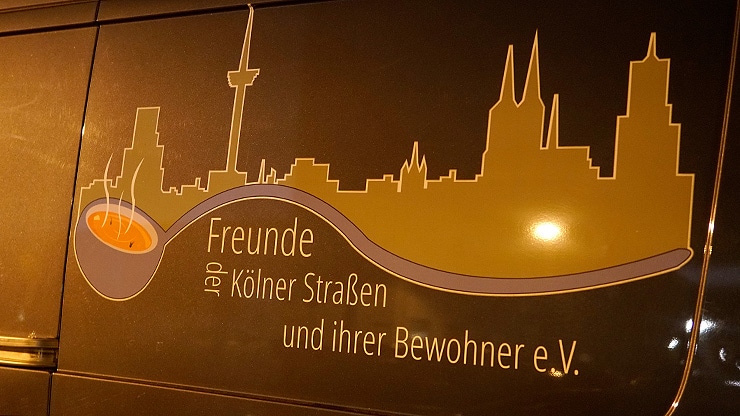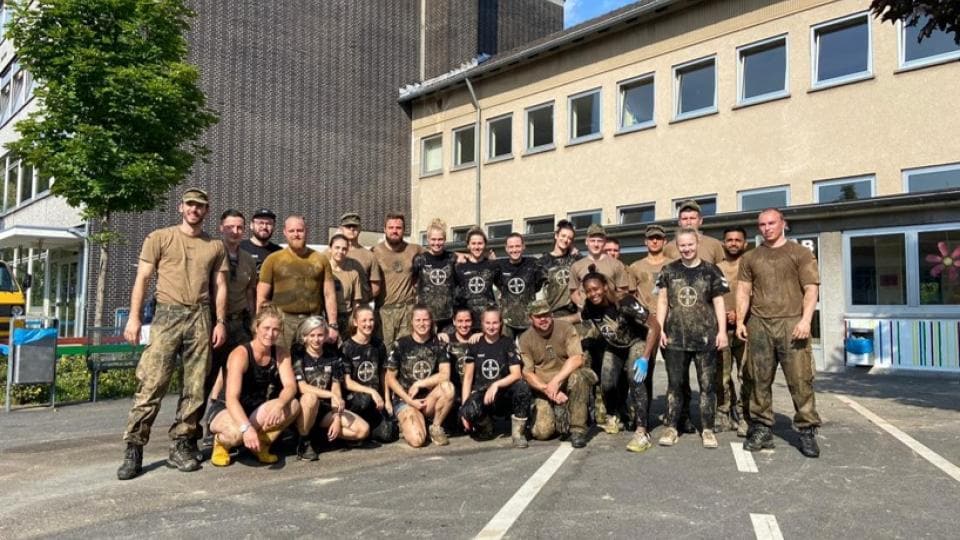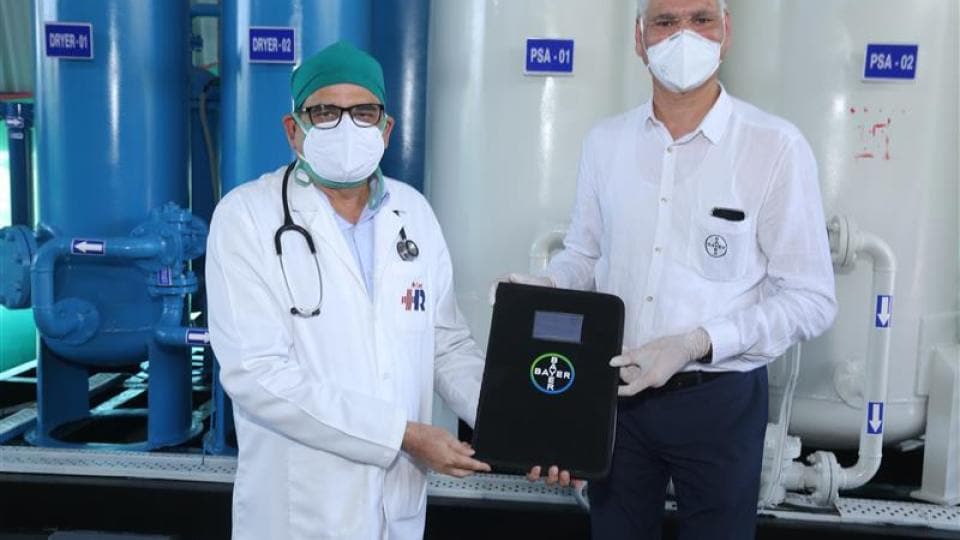Caring for the Homeless in the Winter Months

Life for people on the streets is particularly difficult during the winter months, involving icy temperatures and extreme hardship – but there is also a great willingness to help. Bayer employee Anja Reichelt volunteers in an association in Cologne that provides homeless people with the basic necessities. She is joined by others offering support, including the Bayer Cares Foundation.
After searching for a location for their headquarters for one-and-a-half years, the “Friends of Cologne’s streets and their residents” [Freunde der Kölner Straßen und ihrer Bewohner e.V.] association finally found one in a former retail unit that used to be a floristry store. This is where Anja Reichelt and the other helpers on duty prepare in their groups for the evening shift ahead.
Reichelt is one of 12 members who make up the core team of the association and give up their free time to look after Cologne’s homeless community. During the day, she works at Bayer as a Junior Consultant for Change and Performance Management and is kept busy with global project support. In the Cologne-based association, which she joined more than three years ago, she deals with life and survival on the streets. In the evenings, she and other helpers provide homeless men and women with coffee, soup, clothing, toiletries and sometimes also thermal mats and sleeping bags.
- 1/5
- 2/5
- 3/5
- 4/5
- 5/5





The association was set up some four years ago. It originally grew out of social media and most of the helpers were initially recruited in this way too. “We started off very small. The first time, five of us headed out with coffee and tea. But it quickly became clear to the founding team that we should do it more often and, most importantly, on a regular basis. And take freshly cooked food with us.”
These days, the volunteers no longer set off into the night with a cart in tow, but in a “cold bus” – a Mercedes van funded through donations. They have adapted the loading area so they can easily store the groceries, clothes and toiletries to be distributed.
The season for the cold bus begins in fall and runs through to the start of summer. Twice a week, on Mondays and Wednesdays, the bus heads over to the area behind Cologne’s central train station at 8 p.m. and then visits many of the locations around the city where people in need meet and sleep. The level of care and support is always adjusted to what is needed and is kept as sustainable as possible. If it’s particularly icy, the cold bus sometimes operates seven days a week and keeps going till the early hours of the morning. There is also a mobile phone number that residents of Cologne can use to contact it.
Whenever she’s in charge, Reichelt goes to the association’s office after work to fill up the big thermos jugs with coffee and tea. She then collects some 25 liters of freshly prepared soup from local caterers who collaborate with the association and provide the soup free of charge. Then she travels to the set meeting points, where she is joined by other helpers. Each evening, up to 100 homeless people receive support from the “Friends of Cologne’s streets”.

“A lot of people harbor misconceptions about the homeless,” says Reichelt. In Cologne, for example, around 5,000 people have registered as homeless. “They are often totally normal people who are living on the streets for all kinds of reasons.” Sometimes it’s down to a stroke of fate, such as the loss of a loved one. And that kick-starts a downward spiral of falling into depression, losing their job, running out of money, being kicked out of their home, and finally living under a bridge.
“If it’s cold and we come across a man who is bald, we ask him if he could do with a woolly hat,” says Reichelt. The association is often the only contact these people have with the everyday world. “By offering food, coffee and clothes, we reach out to them and make it clear that we’re here for them if they want to talk – accepting them as they are.”
The association does the best it can, but it also needs help. Besides Bayer supporting its work with annual four-figure donations, a number of restaurateurs give the association a helping hand by providing free food. The association also enjoys a close partnership with the local FC Cologne soccer club, which this year for the first time even hosted a Christmas party for the homeless and people in need.
Individuals often get in touch to donate clothes, too, which are all kept in the storeroom of the association’s new head office. The space is currently bursting at the seams with tops, sweaters, coats, socks and mountains of toiletries ranging from toothpaste to sanitary towels. “Our priority now is to take all this to those who need it,” says Reichelt as she clambers behind the wheel. Outside, it is cold and dark – a sign that the next shift is about to begin.

Cold Bus in
Germany
In 2016, the “Friends of Cologne’s streets and their residents” became the first organization in Cologne to use a “cold bus” to bring supplies to the homeless. These kinds of buses – sometimes also dubbed “warm buses” or “good night buses” – are a regular sight in many cities. In Germany, they are mostly run by municipal institutions or voluntary organizations such as the German Red Cross or the Order of Saint John. Besides providing them with food and clothing, the workers in the buses also provide information about emergency accommodation and other resources.
Volunteering in an association isn’t the only way to help those sleeping rough. If you see someone living on the streets who looks like they’re in need of some help, you should first ask what kind of help they need and then call the cold bus if you think it’s appropriate. In Cologne, you can reach the bus by dialing
0176 240 71 312. Click here for further information in German.




















